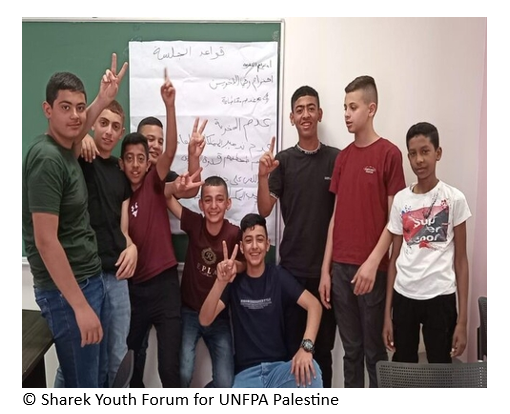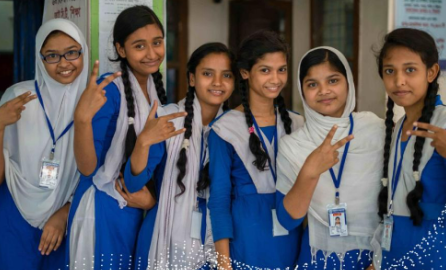Brave men, engaged for positive masculinities and gender equalities in Palestina

-
Gender marker: G2-Promotes gender equality as a primary objective
-
Period of implementation: 2021-2023
-
Amount: EUR 740,871.00
-
Geographical area: Southern Neighbourhood
-
(Co-)funded by: Belgium
-
Implementing partners: The United Nations Population Fund (UNFPA), in collaboration with a variety of NGO partners, among others: Sharek Youth Forum (West Bank); Save Youth Future Society (Gaza); Palestinian Medical Relief Society (All Palestine); Red Crescent for Gaza Strip (Gaza); The Palestinian Working Women Society for Development (West Bank, Gaza); Burj Al Laqlaq (East Jerusalem); Palestinian and Family Protection Association (PFPPA)
-
GAP III’s Areas:
-
Gender-Based Violence
-
Sexual and reproductive health and rights
-
Economic and social empowerment
-
In many parts of the world, discriminatory gender norms impede not only women's fundamental right to equality, freedom from violence and access to sexual and reproductive health and rights but also men's ability to contribute more meaningfully to the health and well-being of their families. Moreover, inequitable attitudes prevent women's equal participation in the productive activities of the community – whether in decision-making or economic activity – undermining their positive contribution to society.
Therefore, and because gender equality is at the heart of its foreign policy, Belgium, as in Palestine, supports UNFPA's work to promote a positive change in the concept and behaviour of masculinity among all men and women, and to create an enabling environment to facilitate a systematic change in gender norms in vulnerable communities.
Tapping into the previous Belgium-funded Majd (which means “glory” in Arabic) interventions piloted in 15 schools in East Jerusalem, the Brave Majd Journey scales up its success in implementing education activities like role-playing and discussions to help change attitudes and ideas of what it means to be a man and confront gender norms. In particular, 2,661 adolescents (1,560 boys, 1,101 girls) benefited from Brave Majd Journey interventions through 96 initiatives and educational sessions in 20 schools and 11 Ministry of Social Development centres (West Bank and the Gaza Strip). In addition, 16 social counsellors (4 males and 12 females) have been trained on how to convey gender and adolescent health-related content to adolescent students and are able to apply the concepts of Majd Diary. As a result of 22 initiatives conducted by adolescents in and out of schools, girls’ participation in activities has increased and gender equality and positive behaviours free from violence or better mental health and wellbeing have been enhanced.
The Majd Journey has resulted in positive outcomes among students as much as educators.
“I learned to respect women's feelings and rights, to express my feelings, to be fair in my decisions. Violence inflicts great damage that we must fight.” Osaid Mahmoud Hanaysha, 13 years old, from Western Qabatya primary school for boys.
In particular, it supports school students’ parliaments with activities such sports, music and theatre to influence attitudes and promote positive masculinities, as well as healthy relationships based on consent and free of violence. In particular, 50% of girls and boys have reported positive attitudes about masculinity, gender roles and responsibilities. Among other activities, the programme also includes counsellors’ training and pre-marriage counselling for engaged couples and individuals to foster self-reflection and transformation of attitudes about issues such as distribution of work at home (e.g. child-rearing, cooking), family planning, decision-making, healthy conflict resolution, and equal financial management. As an innovative approach, engaged couples are provided with incentives, such as wedding photos or flowers for the wedding. As a result of all these efforts, 200 couples have benefited from pre-marriage counselling, 103 counsellors and health educators have been trained in pre-marriage counselling and 190 couples have benefited from couples’ therapy. Moreover, 314 family members (108 men, 117 women, 47 boys, and 42 girls) participated in open days that were strategically integrated within the framework of the ongoing couple therapy sessions, recognising that the dynamics of successful relationships hinge on factors such as dedication, fervour and sustained endeavour by both partners.
Furthermore, in order to create an enabling environment within targeted communities that can facilitate a change in gender norms, this programme supports the YPEER network of youth peer educators who manage to engage 6,000 young people and support reflection on discrimination against women, gender-based violence and sexual and reproductive health and rights, using innovative methods such as interactive theatre. YPEER also help to recruit participants for pre-marriage counselling and couples’ therapy together with community health workers who also act as community liaisons to engage male and religious leaders that have significant influence within the communities. These male and female community health workers are a key entry point for changing norms, providing information to communities on sexual and reproductive health and rights from a gender perspective and challenging traditional concepts of masculinity. In particular, 60 peer educators (40 females, 20 males) have been equipped with knowledge and skills pertaining to gender, positive masculinity and pre-marriage counselling concepts and 1,849 adolescents (1,566 females, 283 males) and youth were reached by peer educators via educational sessions, workshops and events.
The Brave Men programme also sensitises local health and protection providers by coaching them on their own attitudes on masculinity and men's involvement in sexual and reproductive health and rights and gender-based violence services (when safe for survivors according to the Prevention and Response to GBV Minimum Standards).
Finally, for sustainability and further transformation after the close of the project, UNFPA will build the skills of 100 mostly men “positive masculinity champions” who demonstrate significant leadership in changing norms. Also, it will identify social media influencers and equip them with gender equality information through specialised sessions to lead campaigns on positive masculinities using the project’s tools as well as other ongoing initiatives (i.e. HeForShe in partnership with UN Women). Last, but not least, it is also foreseeing to adapt the global fatherhood campaign “MenCare” to the Palestinian context, to work with 30 fathers to support men’s positive involvement as fathers. For instance, so far 49 males (married and unmarried) have been enrolled in the “MenCare” session and as a result of the training 40 masculinity champions (20 females, 20 males) are already promoting positive masculinities in their communities.
Therefore, a whole bunch of positive results show how this intervention has been able to scale up previous successful interventions of its pilot project (2019-2021).
